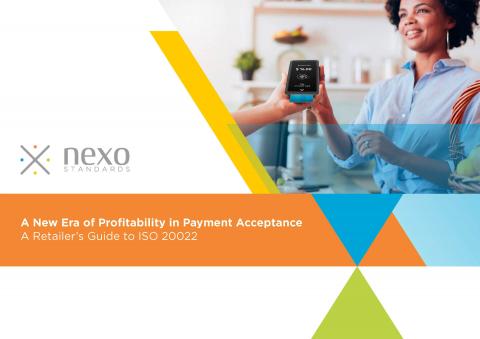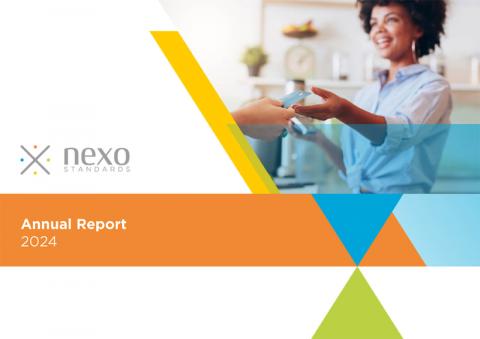
Adyen rejuvenates in-store payment integration with an API POS solution powered by nexo standards
Introduction
Adyen is the payments platform of choice for many of the world's leading companies, providing a modern end-to-end infrastructure that connects directly to Visa, Mastercard, and consumers' globally preferred payment methods. Adyen delivers frictionless payments across in-store, mobile and ecommerce channels. Its key customers include L'Oreal, Superdry, Facebook, Uber, Netflix, Spotify, Tory Burch, Casper and Bonobos.
Today, POS payments still represent the largest global volume, yet the majority of systems remain awkward and inefficient. This case study explores how the adoption of the nexo Retailer Protocol enabled Adyen to deliver a unique way of combining sales and payment systems simply and cost-effectively, with a standardised and centralised solution that delivers real business benefits.
The challenges
Merchants have long grappled with the cumbersome process of connecting payments and sales solutions in a traditional in-store point of sale (POS) set up.
This is because the two functions (sales and payments) are managed separately, locally, and usually in different programming languages. Merchants are then forced to rely on software 'libraries' to integrate the POS registers, terminals and payments systems. Being tied to these complex and extensive libraries not only incurs high initial set-up costs, but also adds complexities to service upgrades and prohibits quick roll-outs of new payment innovations.
To account for programming language compatibility issues with this model, localised updates need to be done manually, meaning management of terminal fleets is difficult and slow. Business risks apply here too, as forced updates and PCI exposure can leave sales staff inconvenienced if these updates occur during trading hours and create resourcing issues for back office staff when updates are required across all store locations.
Adyen saw the opportunity to redefine in-store payments integration and help large international enterprises and leading domestic merchant leaders to overcome these challenges. Adyen looked to nexo's protocols as a cornerstone for developing a powerful, innovative and modern solution fit for some of the world's biggest leading retailers.
Why nexo?
Keen to offer merchants a modern way of connecting in-store terminal hardware to its single payment platform, Adyen assessed the nexo Retailer Protocol. This protocol defines a set of interfaces between a card payment application and a retail point of sale system, and Adyen quickly found it was able to accommodate merchants' needs in a variety of ways. Here's why nexo works for them:
The cloud’s the limit
The nexo Retailer Protocol enables Adyen to centralise its solution with cloud or local-based API options that transform the current resource-intensive, one-to-one library management into a simple, agnostic service model that updates in real-time.
As the local and cloud integrations use standard internet access, there is also no need for complex client configurations. Merchants simply 'plug and play' their terminals to install them and benefit from the latest services.
This interoperable and centralised integration process alleviates the business risks for both the payment processor and its merchant customers. For Adyen, it also means they enhance their payment offering at the point of sale, while delivering consistent integration between POS terminals, cash register systems and their payment platform.
Simplify upgrades globally
By standardising the exchange of payment acceptance data, Adyen is able to realise huge operational efficiencies for merchants. This includes mitigating a number of risks such as forced updates if old versions aren't actively managed and having multiple devices on different versions. Both aspects also drastically slow the delivery of new services, such as shoppers preferred payment methods and makes fleet management complex. With the Terminal API using the nexo protocol, the delivery of new services and system upgrades are dramatically streamlined, removing reliance on local installs of software and updates.
nexo's basic interaction model is request/response JSON messaging. This means that making a payment with the Terminal API is a simple request-response, and all informational events, such as notifying where the terminal is in the payment process, are communicated via JSON webhooks that are optionally implemented. This standardised JSON messaging format, rather than customised libraries, call-backs and SDKs, makes it far easier for merchants to update and roll-out new software.
Compliance and security, instantly
All nexo's standards and protocols are built upon the internationally recognised ISO 20022 standard and conform with PCI DSS, keeping P2PE standards in mind. This not only ensures universality and interoperability between different equipment and payment systems internationally, it also guarantees all implementations are fully compliant and secure, reducing the need to investigate compliance levels with each new country merchants expand into.
Powered up payments processing
Adyen's 'all-in-one' powerful platform gives merchants a unified system that manages all transactions globally via POS, mobile devices and ecommerce, while centralising access and visibility of data. Not only does this realise more immediate efficiencies in terms of costs and resourcing, it also enables a new level of data analysis for merchants across all sales channels while allowing Adyen to continue to deliver future-focused payment innovations.
nexo enables the delivery of this fully integrated super service, as all payments players communicate and interoperate by 'speaking the same language' across borders.
Delivering better services in-store
There are a number of other innovative ways in which the Terminal API is delivering in-store fluidity and advancing customer experiences. For example, since in-store payments can be initiated remotely, merchants can create an experience where a shopper initiates an order in-app, then walks into a store where the sales assistant can then pull the order and push the payment to an in-store terminal (say pay by QR code) on collection of the item. Another example may be a hotel assistant helping a guest check-in on a tablet or mobile device, then routing the payment transaction through to the closest available terminal.
In a fast-paced world increasingly focused on real-time payments and a seamless consumer experience, offering these possibilities to merchants creates a range of exciting new use cases for this technology.
What’s next for Adyen?
Next steps for Adyen's Terminal API is further integration efforts with their Checkout API which will enable merchants to access a full Unified Commerce payment solution. They expect this to be production ready in early 2019. By making its solutions easier to integrate, as well as more efficient and available, Adyen can continue to deliver outstanding value to its customers.
To learn more about the nexo Retailer Protocol, you can download the specifications and read more about the organisation here.
To get started with Adyen's Terminal API view their documentation here or to learn more about their in-store offering click here.
About nexo standards
nexo standards enables fast, interoperable and borderless payments acceptance by standardising the exchange of payment acceptance data between merchants, acquirers, payment service providers and other payment stakeholders. nexo's messaging protocols and specifications adhere to ISO 20022 standards, are universally applicable and are freely available globally.
nexo standards is an open, global association dedicated to removing the barriers present in today's fragmented global card payment acceptance ecosystem. Headquartered in Brussels, its members represent the full spectrum of card payments stakeholders, including acceptors, processors, card schemes, payment service providers and vendors.
nexo was established in 2014, when three historical contributors of card payment standards and specifications were merged: EPASOrg, the OSCar consortium and the CIR SEPA-Fast technical working group.
For more information, please consult www.nexo-standards.org.
About Adyen
Adyen is the payments platform of choice for many of the world's leading companies, providing a modern end-to-end infrastructure that connects directly to Visa, Mastercard, and consumers' globally preferred payment methods. Adyen delivers frictionless payments across in-store, mobile and ecommerce channels. Its key customers include L'Oreal, Superdry, Facebook, Uber, Netflix, Spotify, Tory Burch, Casper and Bonobos.

Removing Barriers in Air Transport Retail Payment Acceptance with nexo standards
nexo standards has published its latest paper, “Chocks Away: Removing Barriers in Air Transport Retail Payment Acceptance with nexo standards”.
The paper explores fragmentation in air transportation payment acceptance systems and shines a light on how, by adopting nexo standards the sector has an opportunity to revolutionise payment acceptance. The paper explores the benefits of...



